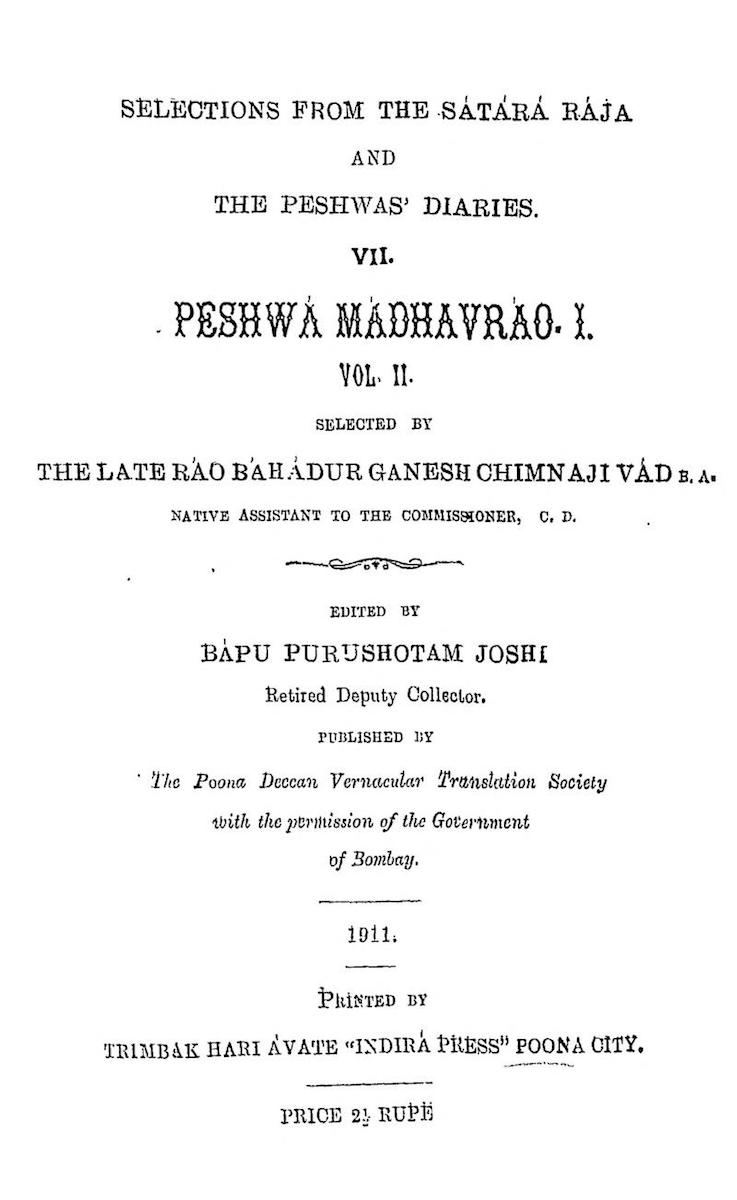Letter to Panduranga Joshi Kulkarni
Annotation
Although the self-immolation of Hindu widows was less common in western India than in Bengal, this letter confirms its occurrence in Maratha-ruled areas during the 1700s. The Marathas were a distinctive ethnic group of peasants who spoke the Marathi language and achieved an impressive reputation as effective guerilla fighters. During the late 1600s, Shivaji, a charismatic, courageous, and politically shrewd Maratha, had created a loose confederacy that gradually expanded from Poona (now Pune) in western India across much of central India. Shivaji’s successors became the rajas (rulers) of Satara who sought to legitimate Shivaji’s and their political control through claims to be defenders of Hindu traditions, including the high ritual status of brahmans.
Since the surname of Joshi indicates that the deceased man in this letter was a brahman, his widow might have been socialized to accept sati as her religious duty to maintain and enhance the status of her family as brahmans. However, this letter also indicates that material motives might influence male relatives to prevent a Hindu widow from committing self-immolation.
This source is a part of the Sati teaching module.
Text
Document no. 764 year 1769-70 pp.339-40
A letter from the Secretariat to Panduranga Joshi Kulkami of the town of Talegaon and the villages of Jategaon, Pabal sub-division, and Karandi, Chakan sub-division stating:
Ramaji Malhar Joshi, the village accountant of the above-named villages came and petitioned stating “I own a share of the hereditary position of astrologer and accountant in these villages. I had one son, Naroba whose first wife bore him two daughters and so he married a second time in order to get a son. Then Naroba was suddenly stricken by paralysis and died in Talegaon town. Thereupon his wife, my daughter-in-law, Chimabai began to insist vehemently upon accompanying him (sahagamana). At that time all my relatives, and the headman of the township, the respectable villagers, the heads of the merchants, the hereditary township servants and affluent householders and local Brahman community all gathered to consider the matter.” They thought :“Ramaji is aged and needs to be cared for but Chimabai will not live if she is without a son. Therefore a son should be found for her to adopt.” They sought my nephews Antaji Vinayak and Visaji Vinayak, but neither of them lived in the village; they were settled elsewhere along with their families. Meanwhile, night fell. There was little time left (before the cremation had to be performed). Then Visaji Vinayak had no son; Antaji had two sons. But there was a long-standing enmity between us, so it did not seem likely that he would give up a son. So they approached my cousin Abaji Moreshwar and asked for his son. Abaji responded “I have two sons, but my wife has died. I have no hope of more sons. It is not expedient for me to give one of my sons.” Then everyone decided on another plan. “Ramaji Malhai’s relative Sadashiv Appaji is at hand; he has four sons. Furthermore, in the past Sadashiv Appaji’s father Girmaji Dadaji had no son, he sought and received Chinto Appaji Ramaji Malhar’s paternal uncle, from Annaji Kakdev, who was Ramaji’s grandfather. So brotherly relations have been long established and so let us seek one of Sadashiv Appaji’s four sons.”
[Ramaji continues:] “So I went with all the villagers to saubhagyavati Manubai and we abased ourselves and begged her to give the youngest son, Pandurang so that I get a grandson and Naroba a son. After much pleading, saubhagyavati Manubai was forced to consent, and in everyone’s presence she gave Panduranga to me; I went and seated him in Chimabai’s lap. So she was comforted and stayed (from the fire). I and the villagers have written out declarations of all this addressed to Pandurang, and now let the Lord issue letters of enjoyment (of the hereditary offices) in the name of Panduranga Narayan.”
Credits
A letter from the secretariat to Panduranga Joshi Kulkarni of the town of Talegaon and the villages of Jategaon, Pabal sub-division, and Karandi, Chakan sub-division. Selections from the Satara Raja and the Peshwa's Diaries - Part 7 Peshwa Madhavrao I, Vol. 2. Translated from Marathi by Sumit Guha. Selected by the Ganesh Chimnaji Vad. Edited by Bapu Purushotam Joshi Poona. The Poona Vernacular Translation Society, 1911.
